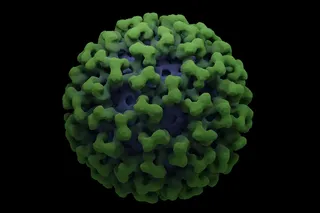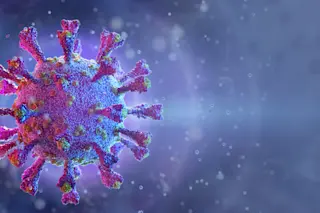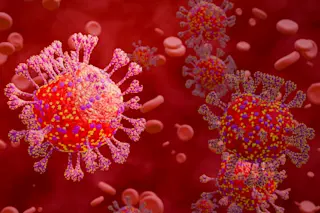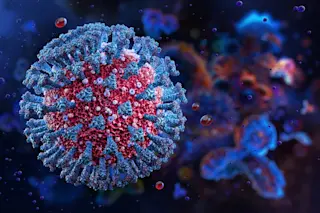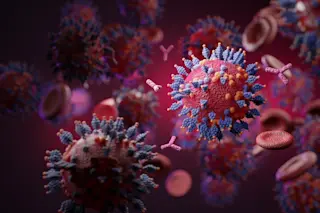My cousin Steve's wedding a few months ago was a lavish affair, and when his sister-in-law Lynnie cornered me by the bar at the end of the reception we were both somewhat the worse for a few glasses of champagne.
So I hear you take care of AIDS patients, she said, sipping a refill. But I don't get it. I keep reading that there's nothing to do for them. So what do you actually do? Hold their hands? How can you stand it?
In my slightly woozy condition, it seemed that a smile, a shrug, and a quick escape to the powder room was the best way to handle that one. But if it hadn't been so late, and the music hadn't been so loud, and the champagne hadn't been so potent, I would have told Lynnie about Beatrice Kaye.
Last year Ms. Kaye was admitted to the AIDS floor of the hospital where I work, during one of my months as the supervising attending physician on that ward. Every morning during these months I meet with the interns and residents on the ward, to examine new patients admitted the day before and to talk over any problems that have come up with the others. Tradition labels these morning meetings rounds, although we spend most of the time sitting around a table rather than walking around a big ward from one bed to the next.
That month I had an excellent team of hardworking, conscientious interns and residents. No one had arrived with the attitudes toward AIDS patients that can poison the experience for everybody. A month spent with an intern who dislikes the patients and fears their disease is a nightmare, but this month was, so far, going well.
We only got one admission last night, said Chris, the senior resident, when I showed up for rounds that morning, coffee cup in hand. Medically I don't think there's much to talk about, but she has a lot of other issues that would be important to explore with the interns. She has death-and-dying issues, and termination-of-care issues, and competence issues, and custody issues, and living-will issues, and even assisted-death issues. It could be a really great morning! Chris, a resident in the hospital's social medicine program, sometimes got a little carried away in his enthusiasm.
But he was right. Ms. Kaye's story was a textbook case of psychosocial issues in AIDS care. She was just 26 years old, and she'd had AIDS for years, having been infected by a husband whose whereabouts she no longer knew. In the previous four years she had survived a half-dozen hospitalizations for three major AIDS-related pneumonias and a severe AIDS- related brain infection. Only a few days earlier, she had left a hospital downtown after another two-month admission for weakness, diarrhea, and abdominal pain.
Chris had called the other hospital the night before and got a detailed history of Ms. Kaye's stay there, which included every possible test and X-ray of her stomach, bowel, and liver. All results had been negative. Ms. Kaye had finally signed out of that hospital, discouraged and no better. At home, without intravenous fluids for a few days, she had become so weak and nauseated that her family called an ambulance and brought her to our nearby emergency room.
It's pretty sad, said Ricki, the intern who was presenting her case that morning. Everybody knows she wants to die at home, but then she really starts to die and her family all get scared. She has a four-year-old son and a six-year-old daughter at home, and it got to be too much, especially for the kids, so they brought her back in. But she doesn't want to be here; she doesn't want any more tests. She wants to be home. Maybe if we can get her some nursing backup, we can send her home in a few days. And maybe some counseling for the kids. She really doesn't want to go on anymore.
For every patient with AIDS there comes a point when someone has to say Enough. Sometimes the patient says it first, sometimes the doctor. Ideally, both say it together. The message is always the same: it's time to stop fighting this implacable disease with X-rays, antibiotics, and grueling hospitalizations--it's time to concede the struggle and begin gracefully to prepare for the end. Ms. Kaye appeared to have reached that point. Our job would be simply to keep her as comfortable as possible during her few remaining weeks of life.
When the house staff took me to meet Ms. Kaye, she was curled up in bed, a wasted, delicately beautiful woman who watched us with dull eyes. She had a low-grade fever, and her blood pressure became dangerously low whenever she sat up. Although her abdomen was tender all over, I couldn't feel any abnormal masses or enlarged organs. She was lethargic, almost moribund. Her breakfast sat untouched on the bedside table. All she would say to me was, No more tests.
Back in the conference room we agreed on a plan for Ms. Kaye that included pain medication, do-not-resuscitate orders, and counseling for Ms. Kaye and her children. The hospital's visiting-nurse liaison would help us by making arrangements for outpatient nursing care. We were all satisfied with the plan, and when we talked it over with Ms. Kaye, she seemed satisfied, too.
But after I left the ward at noon and went back to my office, something kept bothering me. It bothered me all through lunch and all afternoon while I was seeing other patients. I just couldn't get the results of Ms. Kaye's routine-admission blood tests out of my mind. Her blood tests weren't at all what you would expect from a person who had reportedly almost died of diarrhea and dehydration at home. Diarrhea depletes the body of intestinal fluids that are rich in potassium, causing potassium levels in the blood to drop. But the concentration of potassium in Ms. Kaye's blood was abnormally high rather than low. Her kidney function, which is usually abnormal in states of dehydration, was surprisingly normal. The concentration of sodium in her blood was very low, for absolutely no good reason. And her blood sugar was low. Each of these conditions, by itself, can be seen in a person with end-stage AIDS without causing much surprise. Together, though, they spell out a completely different diagnosis.
Forget that she has AIDS, I said to Chris late that afternoon. I asked him to imagine that Ms. Kaye was just a young woman with fever, diarrhea, low blood pressure, abdominal pain, low sodium, high potassium, low blood sugar, and normal kidney function. Then what would you say?
Chris hesitated for a minute. Hm, he said. I'd probably say she had adrenal failure.
Exactly.
Because the human body has only a handful of ways to respond to disease, the symptoms of completely unrelated conditions are often almost identical. A chronic cough, for example, can be triggered by pneumonia, asthma, or heart failure. Nausea can be caused by food poisoning, a gastric ulcer, or a heart attack. In the same way, Ms. Kaye's limpness, lethargy, nausea, and weight loss were all characteristic of the last stages of AIDS- -but they were also symptoms that commonly result when the adrenal glands stop making enough of the hormones that, like the oil in a car, keep the body's metabolic systems lubricated and functioning smoothly. Although the doctors at the hospital she had just left had conscientiously evaluated her condition, this was one possible diagnosis they had evidently overlooked.
Chris and the rest of the team didn't need a lot of convincing to make one tiny exception to the no more tests pact we had made with Ms. Kaye. Even she grudgingly agreed that a few more tubes of blood sent to the lab to check on her adrenal gland function couldn't hurt. That morning the house staff had learned how important it is to know when to say Enough. Now they were going to learn how important it is, sometimes, to know when to take it back.
The adrenal glands are two little pyramids of tissue sitting on top of the kidneys, churning out cortisol, aldosterone, and other hormones that regulate blood pressure, appetite, and energy level. Sometimes the glands stop working when they are infiltrated and destroyed by cancer or by infections such as tuberculosis. Sometimes the glands fail because of an abnormal immune response to the adrenal tissue, as in the case of John F. Kennedy, who, at the age of 30, was found to have idiopathic adrenal insufficiency, or Addison's disease. Sometimes the glands work as hard as they can, but they just can't keep up with the body's demands for their hormones. In some people with HIV infection, the virus itself seems to affect the way cells process adrenal hormones, so that the body requires more of the hormones than the glands can supply. Although researchers don't understand exactly what causes adrenal failure in people with AIDS, doctors are learning to be vigilant in distinguishing between the relentless decline of AIDS and the easily reversible decline of AIDS-related adrenal insufficiency.
Adrenal failure responds beautifully to medication. Once his condition was diagnosed, JFK functioned normally for the rest of his life on a drug regimen that replaced his adrenal hormones. Had medication not been available, though, or had his condition not been accurately identified, he would probably have been, like Ms. Kaye, increasingly disabled by fatigue, weight loss, and weakness. He would have developed problems maintaining his blood pressure, and he might have had fever, nausea, and diarrhea. His blood tests would have come to reflect the absence of aldosterone, the hormone that maintains normal levels of sodium and potassium. His skin might have darkened slightly in response to a pituitary hormone, MSH (melanocyte-stimulating hormone), that rises steeply in adrenal failure to try to goad the faltering glands into action.
Although it is easy to treat, adrenal insufficiency can be tough to diagnose. It tends to mimic a lot of other diseases--depression, anorexia nervosa, and other chronic wasting syndromes such as cancer and AIDS. Blood tests can be extremely helpful in distinguishing between these conditions. Analyzing the amount of cortisol--an easily measured energy- regulating hormone--before and after an injection of an adrenal-stimulating hormone can show if the adrenal glands are capable of doing their job. But even blood tests don't always provide a clear answer. Puzzlingly enough, in patients with AIDS cortisol tests can be normal even when the symptoms of adrenal failure are present.
The best way for us to find out what was going on with Ms. Kaye would be to test her blood cortisol levels and also watch her response to replacement adrenal hormones. We had to make the diagnosis with care because the hormones used to treat adrenal failure impair normal immune function and can actually exacerbate the immune deficiency of AIDS if given over a long period of time. Although the dosage is usually small enough to minimize this side effect, we wanted to be quite certain of Ms. Kaye's condition before prescribing a long course of treatment.
After the house staff drew Ms. Kaye's blood for cortisol levels, they wrote an order for her to begin receiving replacement adrenal hormone pills. Thirty-six hours later, when I came up to the ward for morning rounds, the conference room was empty. I waited there alone for a few minutes, then went in search of the team. I found them at Ms. Kaye's bedside. They couldn't take their eyes off her. Hesitant but smiling, she was sitting up, eating her breakfast. It was the first full meal she had eaten in months. Later that day she began to walk around the ward. The next afternoon she signed out of the hospital. I'm feeling fine, she said. Gotta get home to the kids.
A week after she left the hospital, we got the results of her blood tests. Her cortisol levels were normal. Still, Ms. Kaye's dramatic recovery confirmed that she had really been in adrenal failure. She just needed higher than normal levels of the adrenal hormones to keep her body's metabolism on an even keel.
A month after Ms. Kaye left the hospital, I got a call from a Dr. Kalman, the medical director of the neighborhood HIV clinic where Ms. Kaye received outpatient care. His voice boomed through the telephone receiver so enthusiastically I had to hold it away from my ear.
My nurses didn't recognize her! She just came in to get her meds renewed. She looks like a completely different person. She's gained 25 pounds. She says she's going back to work. She told me to tell you all 'Thanks.'
He paused. You know, he said a little more quietly, we all thought she was a goner. We told the family to call a funeral director, to get everything prepared. We did the death counseling with her, with the kids. . . . I guess we were a little premature. It's a good lesson for us all.
About six months later, Dr. Kalman called back. Nothing had changed except that Ms. Kaye was actually back at work in an office downtown.
This is the story I would have told Lynnie at cousin Steve's wedding, but instead I got another glass of champagne--for a silent toast to Beatrice Kaye.



